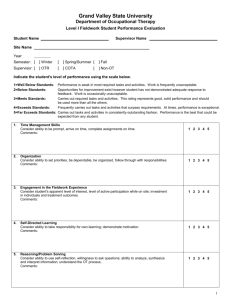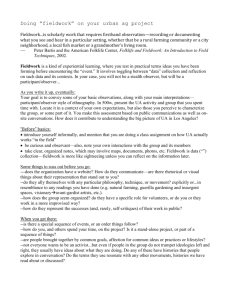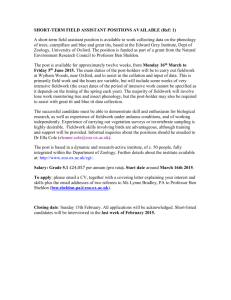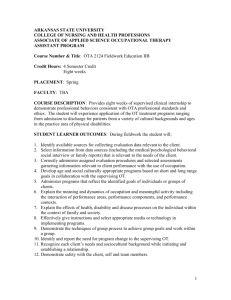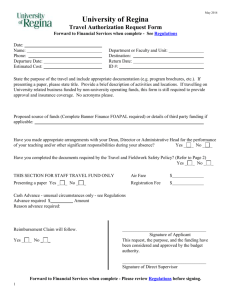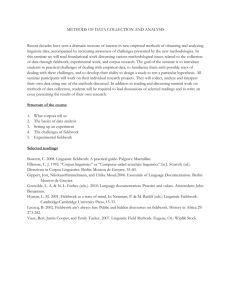SYLLABUS – Green 0813
advertisement
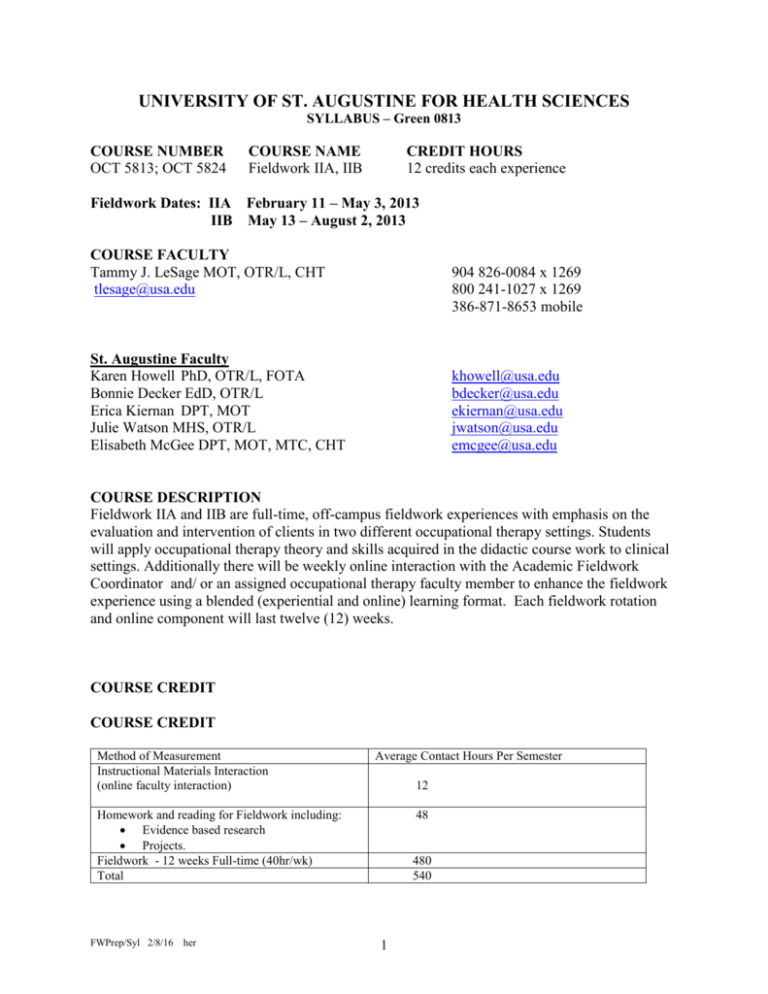
UNIVERSITY OF ST. AUGUSTINE FOR HEALTH SCIENCES SYLLABUS – Green 0813 COURSE NUMBER OCT 5813; OCT 5824 COURSE NAME Fieldwork IIA, IIB CREDIT HOURS 12 credits each experience Fieldwork Dates: IIA February 11 – May 3, 2013 IIB May 13 – August 2, 2013 COURSE FACULTY Tammy J. LeSage MOT, OTR/L, CHT tlesage@usa.edu 904 826-0084 x 1269 800 241-1027 x 1269 386-871-8653 mobile St. Augustine Faculty Karen Howell PhD, OTR/L, FOTA Bonnie Decker EdD, OTR/L Erica Kiernan DPT, MOT Julie Watson MHS, OTR/L Elisabeth McGee DPT, MOT, MTC, CHT khowell@usa.edu bdecker@usa.edu ekiernan@usa.edu jwatson@usa.edu emcgee@usa.edu COURSE DESCRIPTION Fieldwork IIA and IIB are full-time, off-campus fieldwork experiences with emphasis on the evaluation and intervention of clients in two different occupational therapy settings. Students will apply occupational therapy theory and skills acquired in the didactic course work to clinical settings. Additionally there will be weekly online interaction with the Academic Fieldwork Coordinator and/ or an assigned occupational therapy faculty member to enhance the fieldwork experience using a blended (experiential and online) learning format. Each fieldwork rotation and online component will last twelve (12) weeks. COURSE CREDIT COURSE CREDIT Method of Measurement Instructional Materials Interaction (online faculty interaction) Average Contact Hours Per Semester 12 Homework and reading for Fieldwork including: Evidence based research Projects. Fieldwork - 12 weeks Full-time (40hr/wk) Total FWPrep/Syl 2/8/16 her 48 480 540 1 PLEASE NOTE: You will be accessing some of your course materials in an online format we refer to as blended learning. The goal of using web enhanced instruction is to provide you with alternate methods of studying and learning materials. You can log into the course platform by clicking on MyUSA (https://my.usa.edu/ICS/) and selecting your course from the My Courses link in the left hand menu. COURSE PREREQUISITES Successful completion of all occupational therapy program courses. COURSE OBJECTIVES Upon completion of the Fieldwork II requirement, the student will be able to: 1. Adhere consistently to American Occupational Therapy Code of Ethics, safety regulations and use sound judgment in regard to safety of self and others. [B2.8, B9.1] 2. Clearly and confidently articulate the values and beliefs of the occupational therapy profession; the value of occupation and communicate the roles of the occupational therapist and occupational therapy assistant to clients, families, significant others, colleges, service providers and the public. [B2.1, B2.2, B2.3, B2.5, B4.5, B5.16, B5.18, B9.8] 3. Select relevant areas to screen or assess and administer appropriate standardized and nonstandardized screening tools and/or assessment procedures needed to evaluate an individual’s current status and occupational profile [B4.1; B4.2; B4.3, B4.4]. 4. Adapt administration of assessment procedures and adapt or grade intervention methods based on client performance and occupations that are pertinent to the client’s needs [B4.2]. 5. Accurately articulate rational for the evaluation process, interpret, document, and report evaluation findings relative to an individual’s meaningful occupations [B3.5, B4.6; B4.8; B4.10]. 6. Identify factors that may bias assessment results, including culture, disability status, situational variables [B4.7] 7. Develop, implement, and monitor occupationally based intervention plans and strategies that are established from the individual’s goals, evaluation findings, the individual’s current status, and evidence-based practice [B5.1, B5.2, B5.3, B5.4, B5.24]. 8. Apply and teach compensatory strategies such as using technology, environmental adaptations, and involvement of humans and non-humans when desired life tasks cannot be performed [B5.8, B5.9]. 9. Adhere to safety precautions during screenings, evaluations, and therapeutic interventions [B2.8, B9.1] FWPrep/Syl 2/8/16 her 2 10. Identify and recommend referrals to other appropriate specialists for additional evaluation, consultation, or intervention based on individual needs [B4.9; B5.15, B5.23]. 11. Monitor and re-assess the effect of OT intervention in collaboration with a client, including the need for continued or modified intervention [B5.19, B5.24, B5.25, B5.26, B5.27] 12. Develop and promote the use of appropriate home and community programming to support performance [B5.15] 13. Train others, including the individual/family/significant others, professionals, and nonprofessionals in appropriate programming to meet individual needs [B5.16; B5.18]. 14. Develop collaborative discharge plans with the client by reviewing the client’s needs, resources, and the anticipated discharge environment [B5.25]. 15. Terminate OT services when outcomes have been achieved or when desired outcomes cannot be achieved [B5.27]. 16. Demonstrate therapeutic use of self in all verbal, non-verbal and written interactions [B5.5]. 17. Document OT services to ensure accountability of service provision and to meet standards for reimbursement of OT services [4.10; 5.28]. REQUIRED RESOURCES/TEXTBOOKS Required textbooks are dependent upon the fieldwork setting. It is recommended that students take all resources, including textbooks and course handouts to both fieldwork experiences. TEACHING AND TESTING METHODS Students must meet the learning and testing requirements of each individual fieldwork setting as assigned by their facility fieldwork supervisor. Please note these requirements may be different for each setting and for each student. It is the student’s responsibility to participate in the learning experiences required of each setting with which they are placed. Students will participate in a weekly online learning component to enhance their fieldwork experience. The online component will consist of 12 Units for each 12 week fieldwork experience with weekly assignment submissions. There are no online examinations. You will have weekly communication with OT faculty during each twelve week rotation. Dialogue between you and the faculty member is designed to enhance your learning experience throughout your fieldwork rotation with respect to area of practice. Please understand your dialogue with faculty may only consist of topics associated with practice such as assessments, interventions etc. All other concerns regarding fieldwork management such as dates of the rotation, missed dates, supervision, site concerns or requirements, etc will be managed by your Academic Fieldwork Coordinator, and the Clinical Education Department. Online Assignments FWPrep/Syl 2/8/16 her 3 Assignments weeks 1, 3, 6, 9 and 12 with your AFWC consist of fieldwork documentation required for completion of your fieldwork experience. All documents are due on Friday of that week by 5:00pm EST. It is the student’s responsibility to insure all appropriate paperwork is returned timely via this online platform, email or via fax per the timeline in this syllabus. Please contact your AFWC immediately if you need to request a change in the submission dates for these assignments. Assignments 2, 4, 5, 7, 8, 10 and 11 with your assigned OT faculty member will consist of responses to each weekly posting which are due on Friday or as documented on the course syllabus in the event of a holiday. Please refer to the “Course Writing” section of this syllabus for further instruction regarding scholarly writing. Faculty will reply to your postings by midnight Tuesday or within 48 hours of your posting if submission date of your posting is changed due to a holiday. Faculty will provide scholarly dialogue in order to enhance the students learning experience with fieldwork as well as inform the student if their assignment performance meets “satisfactory” standards. Although a grade is not assigned to the weekly submissions, in order to inform the student of a “satisfactory” submission, the number “1” will be assigned via the online grade book. Therefore “1” equates to a “satisfactory” performance; “0” equates to an “unsatisfactory” performance. Two (2) submissions of “unsatisfactory” will result in an “Incomplete” in the course until the submissions are redone to the satisfaction of the faculty member assigned to the student. Submissions of “unsatisfactory” will be graded on content, organization and mechanics of the responses via the following grading rubric. Content Organization Mechanics 0-4 points possible 0-3 points possible 0 -3 points possible Grading Rubric Content Consistent, appropriate, rich and specific. 4pts Organization Ideas are clear and logical 3pts Usually consistent and appropriate 3pts Minimally effective, inconsistent or inappropriate 2pts Ideas are usually clear and arranged in acceptable sequence 2pts Minimally effective problems in approach and sequence. 1pt Does not meet requirements 0pts Does not meet requirements 0pts FWPrep/Syl 2/8/16 her 4 Mechanics Rules of grammar, spelling, and punctuation usage are followed throughout. 3pts Mostly consistent, errors do not interfere with understanding 2pts Grammar etc. are distracting and could interfere with understanding. 1pt Grammar etc. interfere with understanding 0pts COURSE ASSIGNMENTS: Fieldwork IIA: February 11 – May 3, 2013 Unit/ Faculty Unit 1 AFWC Unit 2 Assigned Faculty Unit 3 AFWC Unit 4 Assigned Faculty Unit 5 Assigned Faculty Unit 6 AFWC Unit 7 Assigned Faculty Unit 8 Assigned Faculty Unit 9 AFWC Unit 10 Assigned Faculty Unit 11 Assigned Faculty Unit 12 AFWC FWPrep/Syl 2/8/16 her Assignment Week One Form Read and Respond Week Three Form Read and Respond Read and Respond Mid-Term Evaluation Read and Respond Read and Respond Week Nine Form Read and Respond Read and Respond Final Evaluation Due Date Friday February 15 Friday February 22 Friday March 1 Friday March 8 Friday March 15 Friday March 22 Friday March 29 Friday April 5 Friday April 12 Friday April 19 Friday April 26 Friday May 3 5 Comments Submit Week One Form Submit Week Three Form Submit MidTerm Submit Week Nine Form Submit Final Fieldwork IIB May 13 – August 2, 2013 Unit/ Faculty Unit 1 AFWC Unit 2 Assigned Faculty Unit 3 AFWC Unit 4 Assigned Faculty Unit 5 Assigned Faculty Unit 6 AFWC Unit 7 Assigned Faculty Unit 8 Assigned Faculty Unit 9 AFWC Unit 10 Assigned Faculty Unit 11 Assigned Faculty Unit 12 AFWC Assignment Week One Form Read and Respond Week Three Form Read and Respond Read and Respond Mid-Term Evaluation Read and Respond Read and Respond Week Nine Form Read and Respond Read and Respond Final Evaluation Due Date Friday May 17 Friday May 24 Friday May 31 Friday June 7 Friday June 14 Friday June 21 Friday June 28 Friday July 5 Friday July 12 Friday July 19 Friday July 26 Friday August 2 Comments Submit Week One Form Submit Week Three Form Submit MidTerm Submit Week Nine Form Submit Final All Unit Assignments are due on the Friday as documented above. In the event the server goes down and you cannot submit your assignments, there will be an extension of the assignment deadline. You will be e-mailed within 4 days of your unit assignment deadline if your assignment has not been received. If you do not hear from your instructor by four days, assume that your assignment was received. Unforeseen circumstances regarding late submissions must be discussed with the respective faculty and is up to the faculty’s discretion. Other: To open the PDF-files you need to download Acrobat Reader; this software is available free at www.adobe.com. If at any time the server goes down and you are unable to access your course, continue to try. If after a day you are still unable to access the server, notify your instructor and the Help Desk: TechHelp@usa.edu. FWPrep/Syl 2/8/16 her 6 COURSE WRITING: All writing for this course (bulletin board postings, emails and submitted assignments) should reflect the attributes of clarity, precision and power. Please check all work for errors in spelling, punctuation and mechanics before submission. Please bring all errors in the course, or in any communication, to the attention of the course instructor. The voice of the writings should be reflective and in the first person as if conducting a casual or scholarly conversation among colleagues and peers. Normally, first person present tense is not permitted in graduate writing. However, in this course (unless advised otherwise), a first-person style of writing is preferred. To promote our distant conversation, we would like to see phrases like, “I think”, “I believe” and tense language like “today” or last semester.” Learning is not a top-down process. Each of us shares in the responsibility of educating and being educated. Students are expected to make positive contributions that foster a professional, analytic atmosphere. Healthy debate is encouraged, but students must remain mindful that remarks that demean others and/or their opinions are not tolerated. PLAGIARISM AND CITATION OF SOURCES Academic honesty is expected of all students. It is expected that all student work will be that of the student’s, or it will be cited with a source if it is the work of another author or scholar. Plagiarism occurs when a student uses another person's ideas or words without properly citing the source of that material. A graduate student it is expected to have to properly cite their sources and to know what constitutes plagiarism. If you are not absolutely sure what constitutes plagiarism, I encourage you to visit the websites: http://sja.ucdavis.edu/files/plagiarism.pdf and http://gervaseprograms.georgetown.edu/honor/system/53377.html Most courses at the University of St. Augustine require students to follow the style guidelines of the American Psychological Association (APA) or the American Medical Association (AMA). Both styles have publications available to assist the student in conforming to these styles. You can also check these website: www.apastyle.org and http://www.ajph.org/misc/ama_references.shtml for further assistance. Please check with your course instructor as to the preferred style. NOTE: Instructors are trained to detect work that does not appear to be the original work of a student. This is done through the use of web search engines or library database tools as well as any number of plagiarism detection applications. If a student is found to have submitted a plagiarized work the result may be a failing mark for the assignment. Additionally, the faculty member may report the offense to university administration for further action as found in the universities policies on academic dishonesty. COURSE GRADING This course is pass/fail and will be determined based upon scores from the AOTA Fieldwork Performance Evaluation for the Occupational Therapy Student and satisfactory completion of the online assignments. Passing scores for each fieldwork experience, IIA and IIB are as follows: FWPrep/Syl 2/8/16 her 7 The AOTA Fieldwork Performance Evaluation (FWPE) for the Occupational Therapy Student is completed by the OT Fieldwork Supervisor. The passing score is 122 points. Students that fail to get at least 122 points will automatically fail the fieldwork experience. Students must also score at least a “3” on the Ethics and Safety items in order to pass the rotation. Grades will be assigned as follows: Pass = 122 points or higher Fail = 121 points or less Students who do not reach passing scores for the AOTA Fieldwork Performance Evaluation for the Occupational Therapy Student will fail the course and receive the grade of “F”. Students who fail to receive a “satisfactory” for two (2) of their online assignments will receive an “Incomplete” for the course until the submissions are redone to the satisfaction of the faculty member assigned to the student. A student that receives a grade of "Incomplete" via the fieldwork site will be required to participate in remediation assignments. These assignments include, but are not limited to: 1. The student must return to the University to meet with the Program Director and AFWC. 2. The student will be screened by those faculty members who instructed in the area's of academic and clinical deficiencies identified while on the fieldwork in order to determine appropriate classroom and self-study remediation assignments. 3. The student will participate in and complete assignments determined by the appropriate faculty, which may include classroom and self-study remediation. 4. The student will participate in a minimum of a 4-week clinical reassignment in the same type of setting where they received the "Incomplete". PROFESSIONAL BEHAVIORS These are determined by the clinical education site. Students are to adhere to all Clinical Education policies that are in the University of St. Augustine Student Handbook. SPECIAL NEEDS AND CONSIDERATIONS In accordance with the Americans with Disabilities Act, this university is dedicated to providing alternative learning and test-taking strategies to any student with a documented need. It is recommended that the student make any arrangements, in advance, with the instructor of each class in which the student desires alternative arrangements. Students are advised to divulge their ADA status and recommended accommodations to their Level II Fieldwork sites. Students who choose not to divulge this information to their sites must advise their Academic Fieldwork Coordinator (AFWC) before participating in Level II Fieldwork. The student is reminded that all documentation of disability related nature must be submitted to the Disability Awareness Committee at the University of St. Augustine for Health Sciences. The committee will make final recommendations on all accommodations. FWPrep/Syl 2/8/16 her 8 Course Evaluations: Course evaluations for the online component of your course are due upon completion of the fieldwork rotation. Please locate the course evaluation link, which normally follows the last unit of your course; this link will take you to the course evaluation. Your feedback is valuable to this process as course evaluation and modification is dependent on your input. Make sure your feedback is constructive so course modifications can reflect your suggestions. FWPrep/Syl 2/8/16 her 9
